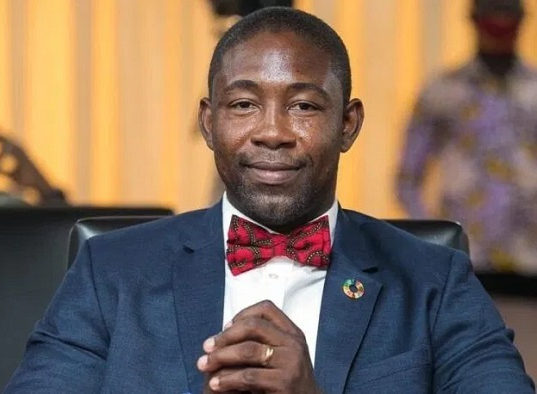The National Health Insurance Authority (NHIA) in June 2022, added treatment of the four common childhood cancers to the National Health Insurance Scheme (NHIS) Benefit Package. These are Acute Lymphoblastic Leukaemia, Burkitt Lymphoma, Retinoblastoma, and Wilms Tumor.
Since its implementation, the childhood cancer policy has been beneficial to many children who suffer from the disease condition, despite a few challenges.
The National Health Insurance Authority (NHIA) conducted initial actuarial modelling of the Scheme’s capacity to absorb the costs of coverage for these childhood cancers with the hope of removing this financial barrier.
It was in this light that the First Lady, Her Excellency, Mrs. Rebecca Akuffo-Addo, announced the inclusion of the four most common childhood cancers at the official launch of the nationwide NHIS Week celebrations in November 2021.
This is evidenced by the submission of claims by credentialed healthcare service providers for services rendered to childhood cancer patients, who are active members of the NHIS.
It is the view of the NHIA that coverage of the four common childhood cancer services was in response to a real need for access to services for a condition that if treated well could save precious lives that would contribute to the nation’s fortunes.
The commitment of the Authority towards this goal attainment is thus unwavering and all measures will be employed to ensure its full implementation in collaboration with stakeholders.
The NHIA initiated processes, as per its Benefit Package review guidelines, for the assessment and operationalization of new benefits and these processes involved mapping out reimbursable management pathways, development of reimbursement protocols, costing of services and tariff development and final actuarial and budget impact analysis.
The mapping out of the management pathway for childhood cancers and the development of reimbursement protocols was carried out by a multi-stakeholder group of paediatric oncologists involved in the direct care of cancer patients from Korle-Bu, Cape-Coast, Komfo Anokye, Ho and Tamale Teaching Hospitals, Geater Accra Regional Hospital and Holy Family Hospital, Techiman; officials from the Ministry of Health, Ghana Health Service, Health Facilities Regulatory Authority and the National Health Insurance Authority.
The NHIA was also informed that these services were provided by a Multi-Disciplinary Team of experts in only seven facilities, namely Korle Bu, Cape-Coast, Komfo Anokye, Ho and Tamale Teaching Hospitals, Greater Accra Regional Hospital and Holy Family Hospital, Techiman.
This informed the roll-out of coverage in these facilities until the appropriate specialists and equipment were made available in other facilities nationwide.
Since its implementation in June 2022, the following Claims have been submitted to NHIA for reimbursement:

Despite the amounts paid above towards the reimbursement of Childhood Cancer services, the NHIA is aware of changing economic conditions that warrant reviews of its prices and tariffs.
Service tariffs and medicine prices were thus reviewed in February 2023 before the annual due date of July in response to changes in prices. These price reviews apply to all other services on the Benefit Package and it’s an annual periodic activity that is done in collaboration with stakeholders.
The NHIA is currently in the process of comprehensively reviewing its tariff building blocks to arrive at tariffs that will further support the viability of facilities while also ensuring the continued sustainability of the scheme.
The NHIA takes note of claims from facilities of non-availability of medicines and consumables at stated prices and will endeavour to engage relevant stakeholders and regulators of the supply chain to purchase healthcare in the most cost-effective manner to ensure quality healthcare services are made accessible to all members of the scheme.
The NHIA values the distinctive role the mass media, members of the scheme, patient support groups and clinicians play in representing the interest of the populace on health issues and further suggests holistic representation of the efforts being made by the scheme towards providing financial risk protection against the cost of quality healthcare services.
Latest Stories
-
Baltasar Coin becomes first Ghanaian meme coin to hit DEX Screener at $100K market cap
14 minutes -
EC blames re-collation of disputed results on widespread lawlessness by party supporters
28 minutes -
Top 20 Ghanaian songs released in 2024
49 minutes -
Beating Messi’s Inter Miami to MLS Cup feels amazing – Joseph Paintsil
1 hour -
NDC administration will reverse all ‘last-minute’ gov’t employee promotions – Asiedu Nketiah
1 hour -
Kudus sights ‘authority and kingship’ for elephant stool celebration
1 hour -
We’ll embrace cutting-edge technologies to address emerging healthcare needs – Prof. Antwi-Kusi
2 hours -
Nana Aba Anamoah, Cwesi Oteng special guests for Philip Nai and Friends’ charity event
2 hours -
Environmental protection officers receive training on how to tackle climate change
2 hours -
CLOGSAG vows to resist partisan appointments in Civil, Local Government Service
3 hours -
Peasant Farmers Association welcomes Mahama’s move to rename Agric Ministry
3 hours -
NDC grateful to chiefs, people of Bono Region -Asiedu Nketia
3 hours -
Ban on smoking in public: FDA engages food service establishments on compliance
3 hours -
Mahama’s administration to consider opening Ghana’s Mission in Budapest
3 hours -
GEPA commits to building robust systems that empower MSMEs
3 hours

